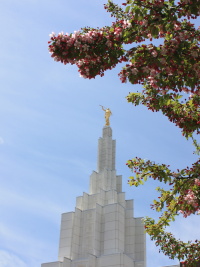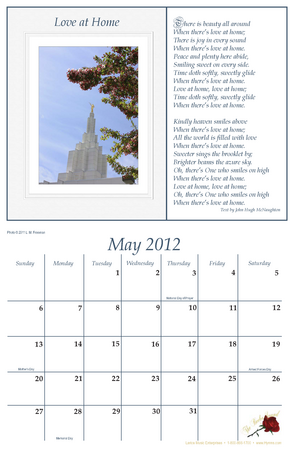 Another classic nineteenth century composition, this peaceful hymn, also known as “There Is Beauty All Around,” has been a reference for the ideal home for over 150 years. It is a fitting hymn to study in the month that we celebrate Mother’s Day.
Another classic nineteenth century composition, this peaceful hymn, also known as “There Is Beauty All Around,” has been a reference for the ideal home for over 150 years. It is a fitting hymn to study in the month that we celebrate Mother’s Day.
The text and music were both written by John Hugh McNaughton, and published in 1860 in the American Sunday School Hymnbook, new edition (Philadelphia, Pennsylvania: American Sunday School Union.)
Not a great deal is known about the life of John Hugh McNaughton. He was born in 1829, at Caledonia New York, and died in 1891 or 1901, also at Caledonia, New York.
Caledonia, New York is about 30 miles southwest of Rochester. Scottish emigrants settled there in 1799 and Caledonia was organized 1803 as the Town of Southampton. The name was changed to Caledonia in 1806 and it was incorporated in 1891. Caledonia is an ancient name, which originated with the Romans, for Scotland, or the Scottish Highlands. John came from these Scottish roots and he gave the name Caledonia to the tune for ‘Love at Home.’ From the words he wrote, one could conjecture that his parent’s home was a good model to follow.
It is said that John was known as ‘The Poet McNaughton’ for composing many songs popular at the time, including folk songs, though few have survived to be sung today. Other than ‘Love at Home,’ perhaps his most famous was ‘The Faded Coat of Blue,’ about Union soldiers taken prisoner during the American Civil War.
It is interesting to note that the year John was born Andrew Jackson was inaugurated as the seventh president of the United States. During his lifetime the Indian Removal act was signed and the conflicts with the Native American tribes took place. The Mexican War and the Civil War were also fought. With so much fighting and hate going on in the world, even families divided against each other, it is significant that this was the period of history that gave us this hymn which so eloquently promotes love, peace, joy, beauty and bliss. One could imagine that the soldiers of the time must have longed for the ideal home he described as they were experiencing the opposite. This can be true for any of us. What a blessing are those who create such homes.
A fourth verse sometimes included with the hymn points out the relationship between the love of the Lord and the presence of love at home.
Jesus, show Thy mercy mine,
Then there’s love at home;
Sweetly whisper I am Thine,
Then there’s love at home.
Source of love, Thy cheering light
Far exceeds the sun so bright—
Can dispel the gloom of night;
Then there’s love at home.
 The words of the other verses of the hymn reflect the rural scenes of life familiar to the author and it is interesting that he specifically calls out a ‘cottage’ as a scene of joy. The image of a ‘cottage’ most likely intended was the small, modest, single story house of a farm laborer, and is a noteworthy reminder that money and power are not prerequisites for love and joy.
The words of the other verses of the hymn reflect the rural scenes of life familiar to the author and it is interesting that he specifically calls out a ‘cottage’ as a scene of joy. The image of a ‘cottage’ most likely intended was the small, modest, single story house of a farm laborer, and is a noteworthy reminder that money and power are not prerequisites for love and joy.
It is also interesting to note that during John’s lifetime, The Church of Jesus Christ of Latter-day Saints was organized, the Book of Mormon was published, the early scenes of persecution and martyrdom took place and the Saints migrated to the Salt Lake valley. If ever a people needed ‘Love at Home,’ they did.
David O. McKay was of Scottish descent and served as President of the Church of Jesus Christ of Latter-day Saints from 1951 to 1970. His grandparents were of those Saints who crossed the plains in 1859. A personal reminiscence of J. Spencer Cornwall records that when the 1948 edition of the LDS hymnbook was printed, the author of ‘There Is Beauty All Around’ (‘Love at Home’) was unknown – neither composer nor author was listed. President McKay was a great admirer of this hymn and asked Brother Cornwall, who was then a member of the Church Music Committee, to find the name of its author.
Soon afterwards while Brother Cornwall was traveling on assignment to Montana, he heard on the car radio a male chorus singing ‘There Is Beauty All Around.’ Reaching his destination he called the station to ask the name of the author and was referred to a station in New Jersey where the program had originated. He wrote that station and was promptly sent a pamphlet stating that John Hugh McNaughton was the both the author and composer of ‘There Is Beauty All Around.’
This information was conveyed to President McKay who remarked that he was sorry it had not been written by a member of the Church but that he was very pleased to know, however, that those lovely words had been written by a Scotsman.
Love at Home Text
There is beauty all around
When there’s love at home;
There is joy in every sound
When there’s love at home.
Peace and plenty here abide,
Smiling sweet on every side.
Time doth softly, sweetly glide
When there’s love at home.
Love at home, love at home;
Time doth softly, sweetly glide
When there’s love at home.
In the cottage there is joy
When there’s love at home;
Hate and envy ne’er annoy
When there’s love at home.
Roses bloom beneath our feet;
All the earth’s a garden sweet,
Making life a bliss complete
When there’s love at home.
Love at home, love at home;
Making life a bliss complete
When there’s love at home.
Kindly heaven smiles above
When there’s love at home;
All the world is filled with love
When there’s love at home.
Sweeter sings the brooklet by;
Brighter beams the azure sky.
Oh, there’s One who smiles on high
When there’s love at home.
Love at home, love at home;
Oh, there’s One who smiles on high
When there’s love at home.

Information in this article came from:
http://nethymnal.org/bio/m/c/n/mcnaughton_jh.htm
http://nethymnal.org/htm/l/o/v/lovehome.htm
http://www.seiyaku.com/hymns/en/430.html
http://mormonchannel.org/history-of-hymns/27
http://www.lds.org/new-era/1975/11/our-heritage-of-hymns?lang=eng
http://dictionary.reference.com/browse/Caledonia
Hymns of the Church of Jesus Christ of Latter-day Saints, (Deseret Book Company, Salt Lake City, Utah, 1985, #294)
Teachings of Presidents of the Church - David O. McKay, (The Church of Jesus Christ of Latter-day Saints, Salt Lake City, Utah, 2003